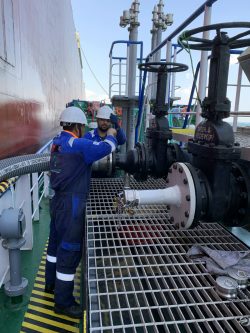by Dr. Ashan Silva, GAC Oman Business Manager - Sohar
According to some sources, around 15 tonnes of plastic is dumped into the world’s oceans every minute, every day.
What’s even more alarming is that it is a growing trend, with that volume set to double easily within the next ten years. As the International Maritime Organisation (IMO) says, if we don’t take aggressive action, there will be more plastic than fish in our seas by 2050.
Some shipping companies have responded by banning single-use plastics on board, replacing it with alternative solutions such as water dispensers, steel water bottles for all crew, metal or recycle paper straws, reusable fabric and more.

Many marine-related authorities like IMO, MARPOL, IMPA (International Marine Purchasing Association) are working to mitigate or control that 20%, including rules, regulations, and control measures through MARPOL Annex V.
Helping you to help the planet
At the Omani port of Sohar, GAC is helping vessels address the issue of marine pollution coming from ships.
Last year, we joined forces with Oman Maritime Waste Treatment (OMWT) SAOC to offer waste collection services, with a dedicated facility for any kind of general waste as defined by the International Organisation for Standardisation including the kind of plastic that could so easily find its way into the sea.
A joint venture between leading companies in environmental solutions, OMWT was selected by the Port of Sohar as their MARPOL Port Reception Facility, inside the port. All types of liquid and solid waste are collected by a specially-built vessel and transferring them to their shore facility to complete the disposal cycle.

GAC coordinates with the registered waste removal vendors and arrange collection through the waste collecting vessel or by providing a quayside skip for vessels at berths to dump their garbage. Port registered waste collectors will collect them for proper disposal through the treatment plants within the port premises, to ensure that plastic and other waste does not simply go to landfills. Their disposal methods used are in line with Omani government regulations.
From April to December 2022, they collected roughly 150m³ of waste materials from ten vessels under GAC’s agency at the port, including plastic.
This service offered by GAC Oman at Sohar aligns with the GAC Group’s Sustainability Strategy including a commitment to specific UN Sustainable Development Goals (SDGs), including SDG 12 – Responsible Consumption and Production, SDG 14 – Life Below Water and SDG 17 – Partnership for the Goals.
Obstacles
But in a world that has become addicted to plastic since the mid-20th
century, the obstacles to eliminating single use plastics are very real.
The initial cost of replacing disposable plastics can be high. Traditional petroleum-based plastic items are much cheaper than their bioplastic equivalent with 1,000 bioplastic lids costing USD 79, compared to just USD 49 for the same number of conventional plastic lids.
Even when the spirit is willing to use eco-friendly options, alternatives are not always readily available with ship chandlers at all seaports.
Then there are health concerns. Non-disposable items need proper cleaning after each use – especially if used by a team - to reduce the risk of spreading infection or disease.
Pressure
Due to commercial pressure and costs involved, ships are unlikely to completely eliminate the use of single use plastic. Only a handful of operators are likely to take proactive action beyond what is mandatory to protect the environment.
However, authorities can keep up the pressure to regulate the causes of pollution through various rules and regulations within the vessel operating procedures.
Urgency
There is no time to waste.
Hand in hand with proper disposal services like the one we offer in Sohar, players like GAC can help provide a clear understanding of the regulatory framework to help companies to avoid possible penalties and support seafaring staff on board with environmental protection efforts.